




By Terrance Rey
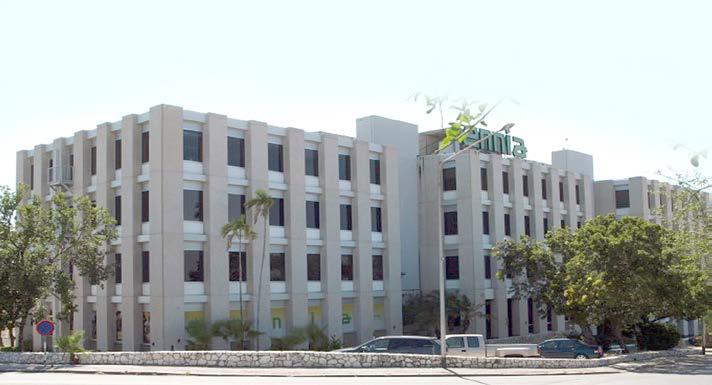
~ And what are the implications
The question of whether the government can guarantee the recovery of the ENNIA pension fund is a critical one, especially for the policyholders whose pensions are at stake. With the looming financial instability of ENNIA, there is increasing pressure on the government to step in and provide assurances. However, while a government guarantee might offer much-needed security to policyholders, it comes with significant challenges and risks.
A government guarantee essentially means that if ENNIA cannot meet its obligations, the government will step in to cover the shortfall, ei-
ther through direct payments to pensioners or by injecting additional funds into the pension system. On the surface, this seems like a simple solution, but the implications run deeper.
On the positive side, such a guarantee would provide immediate confidence to pensioners, reassuring them that their pensions are secure regardless of ENNIA’s financial troubles. For policyholders, especially those close to retirement, this would be a huge relief. However, the downside is that the financial burden shifts to the government. This would likely increase public sector debt or lead to higher taxes to cover the liabilities. Is the government financially prepared to take on this responsibility?
The government’s ability to guarantee the pension fund depends largely on its financial health. St. Maarten, like many small nations, has limited financial reserves. Taking on a major commitment to guarantee ENNIA’s obligations would strain the budget, especially if the island is already grappling with debt or budgetary constraints.
In a stable and growing economy, a government guarantee might be feasible, as increased revenue from taxes and economic activity could support such a move. But in an unstable or declining economy, guaranteeing ENNIA’s pensions could push the government’s finances over the edge.
A government guarantee cannot simply be declared—it requires legal authority. This means new laws or amendments to existing pension laws would need to be passed, outlining the terms of the guarantee and the conditions under which it would be invoked. Additionally, any such guarantee would need to be accompanied by strong regulatory oversight to prevent future mismanagement or instability. This regulatory oversight would be essential to ensure that ENNIA doesn’t continue down the same risky path that led to its current financial troubles.
Strict governance and monitoring by government-appointed officials would likely be
necessary to make sure that any guarantee doesn’t just become a safety net for ENNIA’s risky investments.
One of the most significant consequences of a government guarantee is its impact on taxpayers. Any financial shortfall covered by the government would have to be paid for, either through higher taxes or the reallocation of public funds from other essential services like healthcare, education, or infrastructure. This could cause a backlash among the general public, especially if the perception is that the pension fund’s troubles were caused by mismanagement or excessive risk-taking.

PHILIPSBURG -- Political scientist Julio Romney has assessed the results of the August 19 snap parliamentary elections in St. Maarten, where he believes some politicians have to begin considering their political future.
Romney was positive about the Unified Resilient St. Maarten Movement (URSM) and the Democratic Party (DP), as these two increased their seat counts from two to three seats. “I think that the electorate felt somewhat comfortable with the leader of URSM. URSM didn’t do much campaigning at all. They were busy trying to out fires dealing with St. Maarten problems and the electorate felt he was doing a good job and he was rewarded,” Romney said of Prime Minister Dr. Luc Mercelina, who incidentally was the highest vote getter with 1315 votes.
In assessing the Democratic Party (DP), the oldest political party in St. Maarten, Romney suggested there may been some nostalgic support for the 70 year organization. This, especially seeing the DP celebrated their 70th anniversary this year in the lead up to the election. “I think the cause of that is that
the electorate was looking for someone to vote for other than the UP party and the National Alliance. The Democratic Party, during the election cycle were rather aggressive in campaigning and they were bringing issues to the forefront, which they would consider once they got elected. I believe based on that, as an option, persons would turn to the Democratic Party because as you know, years ago, the Democratic Party was a dominant party,” he explained.
In the meantime, Mr. Romney had sound words of caution for the NOW Party and the United People’s Party; both of which lost a seat each in the elections.
NOW he believes was punished by the electorate as one of their MPs defected which triggered the snap elections just 17 days into the new government. He also believes there is a lack of trust between the current parties that form the government and the NOW, which is why they have not been included in this new government.
“The leader of the NOW party, sort of threw his own coalition under the bus. (He) was not there to support them in a number of motions during the time they were in power. (The electorate) punished them for that, where you see the leader of the NOW party has lost significant amount of votes, to the point where he is not going back to parliament,” he said. Lyndon Lewis, the current justice minister secured majority of the votes on the NOW party and has been elected to parliament.
As for the UP and the NA, Romney believes they have some soul searching to do, as both have

lost support and seats along the way. The NA still remains the largest party in St. Maarten, but its leader lost her seat and eventually resigned from the party. “(Silveria) has been losing support for some time. If you recall the last election, one of the candidates got more votes than she did and that candidate thought that he was the one to deserve to be prime minister so there has always been that bickering within that party,” Romney said.
He also believes the GEBE issue hurt the NA as the electorate felt they should have done something to solve the problem for the time they were in government. “I think much of their campaign had a negative approach and I think the electorate as a whole had no interest for a negative approach for this campaign.”
For the UP leader, Romney believes he too was punished by the electorate as they saw the party as somewhat responsible for some of the problems St. Maarten is faced with. He pointed out that the UP leader “bashing” the URSM leader and prime minster for the ills of St. Maarten, did not help his case at the polls. “I think the electorate, in a sense, just held (UP) accountable for that,” he said.
However, Romney is not happy with the election turnout, which was just over 60%. He believes the short turnaround time of the two elections frustrated the electorate, which led to the poor turnout. Based on the final results, 13,886 voters turned out to vote from the 22,750 eligible voters.

Steady progress on Caribbean guilder project

– For the past week, the flags of Curaçao and Sint Maarten have flown on the property of the Royal Canadian Mint (RCM) in Winnipeg, Canada. The raising of the flags symbolically concluded a special visit to the Mint, where the first strike of the Cg1 and Cg5 coins took place earlier in the day, bringing the CBCS one step closer to the introduction of the Caribbean guilder.
The Cg1 and Cg5 are the final coins in the Caribbean guilder series to be minted, following the completion of the lower denominations. As the coins rolled off the press, Alex Reeves, Senior Manager of Public Affairs at RCM, told Canadian television station CTV News, which was in attendance, that this was a special moment for the Mint in more ways than one, as these are the first tri-metallic coins ever produced by the facility. Composed of three different metals, this type of coin marks a technical innovation for RCM. As part of a tradition at RCM, the flag of each country for which they mint coins is given a permanent place along the driveway of their production facility in Winnipeg. This time was exceptional, as the flags of two countries were added to the display, with the new coins being intended for both Curaçao and Sint Maarten. During the
flag-raising ceremony, the national anthems of each country were played. Representing the CBCS, Supervisory Board members Ahmed Bell and Jason Rogers, Executive Director Leila Matroos-Lasten, and XCG team members Alvin Francisco and Eleanore Reynaert- Vervuurt attended the first strike and ceremony, while Minister of Finance Marinka Gumbs and her
Chief of Cabinet, Nicole Marlin, represented the Country of Sint Maarten. RCM was represented by Marie Lemay, President & CEO, and several RCM-officials.
In her brief address, Leila MatroosLasten remarked that a high-quality product had been achieved and that this was thanks in part to RCM’s expertise: “RCM has proven to be the strategic partner we were looking for. By working together professionally, we have achieved a resounding acceptance of the new coin design by the citizens of Curaçao and Sint Maarten. We look forward to continuing this collaboration in the coming years.”
All Cg coins are expected to be delivered to the CBCS during the fourth quarter of this year.
Willemstad, September 27, 2024
CENTRALE BANK VAN CURACAO EN SINT MAARTEN

It’s important to recognize that a government guarantee would essentially be asking all taxpayers to bail out a relatively small group of pensioners—many of whom may be better off financially than the average citizen. This kind of political and social challenge cannot be ignored.
A government guarantee also raises concerns about moral hazard. If ENNIA’s management knows that the government will step in if things go wrong, they may be encouraged to take on riskier investments or make decisions that could lead to further financial instability.
To counter this, the government would
need to impose strict controls on ENNIA’s operations, ensuring that the fund’s management is not relying on the guarantee as a backup plan. Strong governance is key here, and the government must be prepared to enforce these controls rigorously.
There is also the concern that guaranteeing ENNIA could set a dangerous precedent. If the government steps in to bail out ENNIA, what happens when other pension funds or financial institutions face similar issues? Would the government be expected to step in again, potentially creating a pattern of dependency?

This raises the risk of future financial burdens on the government and taxpayers. It could also incentivize other pension funds to take on more risks, knowing that a government safety net is available.
Rather than offering a full government guar-
antee, there are other potential solutions that could spread the risk without placing the entire burden on the government. One option is to create a pension protection insurance scheme, where all pension funds contribute premiums into a common pool. In the event of insolvency, this fund could be used to cover shortfalls.

Another possibility is a public-private partnership where private insurers work with the government to provide a layer of protection without relying solely on public funds.
A middle-ground solution could be to offer conditional government support based on certain criteria. For example, the government could guarantee ENNIA’s obligations only if the fund meets specific governance or financial performance benchmarks. This would ensure that ENNIA works towards improving its financial health, while the government provides a backstop only if absolutely necessary. By tying the guarantee to financial metrics such as solvency ratios or performance targets, the government could reduce the risk of becoming overly involved while still offering a safety net for pensioners.
While a government guarantee could stabilize the ENNIA pension fund and provide peace of mind to policyholders, it comes with significant risks. The government must carefully weigh the potential impact on public finances, taxpayer sentiment, and future financial crises before committing to such a move.
A more limited or conditional approach might be the better path forward, allowing the government to offer support while mitigating risks and ensuring stronger oversight of ENNIA. Ultimately, the solution to the ENNIA crisis must strike a balance between protecting pensioners and safeguarding the country’s financial future.
Terrance Rey Publisher & Editor
StMaartenNews.com

The international Fintech Islands Experience (FiX) returns to the Caribbean for its third successive year, from January 22-24, 2025, focusing on three core pillars, as it seeks to fulfil its mission to build out the fintech ecosystem in the region. The highly successful financial conference will be held again at the Sam Lord’s Castle Wyndham Grand Barbados Resort.
FiX25 aims to bring together a community of disruptive and innovative leaders who are redefining financial services under its core pillars—entrepreneurship, policy, and talent. These pillars are designed to foster a thriving fintech ecosystem by providing start-ups with the foundation they need, creating regulatory frameworks that enable growth, and developing a knowledgeable
and skilled workforce capable of steering the Caribbean’s fintech future.
Allison Hunte, Cofounder and CEO of Fintech Islands said the Caribbean is witnessing a fintech revolution driven by a diverse array of startups, regulatory shifts, and international partnerships. She stated that since launching FiX, they have also seen increased interest in advancing the fintech industry, adding that several regional Heads of Government, Cabinet ministers and central bankers, as well as international fintech CEOs and developers, are already confirmed to speak at FiX25.
“We are seeing growing registration numbers and increased participation each year and are confident that FiX has established itself as a fixture in the global fintech landscape. With attendees and speakers from around
the world, including Europe, North America, South America, Africa, Asia, and the Middle East, FiX is helping to showcase the Caribbean as a center for financial innovation,” Ms Hunte asserted.
The CEO of Fintech Islands further pointed out that according to a report prepared by the Inter-American Development Bank and Finnovista, the number of active fintech companies operating in Latin America and the Caribbean increased by 340 percent between 2017 and 2023. The number of companies rose from 703 in 18 countries to 3,069 in 26 countries. She, therefore, maintained that the Caribbean is undoubtedly poised for further growth in fintech services.
“We have numerous examples of fintech advancements in countries such as The Bahamas, Jamaica, Barbados and Trinidad
and Tobago, through the development of e-payment systems, digital wallets, central bank digital currencies, peer-to-peer lending platforms, fintech innovation hubs and regulatory sandboxes through which fintech innovation can be tested,” Ms Hunte stated. She continued, “Clearly, the Caribbean has recognized that fintech is a critical tool for financial inclusion and can create new job opportunities and spur economic growth. Additionally, our region offers a strategic opportunity for global fintech players to use its regulatory sandboxes as an experimental space, allowing them to refine and perfect new technologies before expanding them on a global scale.” Fintech Islands is ready to do its part to build the right environment to unlock new fintech opportunities across the Caribbean. The three-day event, which is expected to
attract over 700 attendees from across the globe, along with more than 100 speakers and 50+ sponsors, will explore emerging technologies like AI-driven fintech and blockchain and how these advancements reshape financial security and enhance payment systems to give regional fintech players a competitive advantage.
FiX25 promises a transformative experience, blending business-building opportunities with rich cultural experiences and unparalleled networking prospects.
The Fintech Islands Experience (FiX) is the most promising global event in the fintech sector and the only global fintech conference in the Caribbean. The conference is specially designed for finance professionals and advisors, fintech and tech start-ups, asset managers, investors, government regulators and policymakers, and anyone looking to engage with fintech industry leaders. The inaugural Fintech Islands event attracted 350+ attendees from 25 countries and received exponential global attention with 170+ million traditional media impressions and over 1.4 million social media impressions. For more information, visit the Fintech Islands 2025 official conference website, www.fintechislands.com
For more information, contact Janelle Thornhill 1-246-237-0633
Rum and Sargassum Inc., a local deeptech start-up, and The University of the West Indies Cave Hill campus have launched the first vehicle powered by bio-compressed natural gas (CNG). The bio-CNG uses rum distillery wastewater and a sargassum-based biomethane, an innovative fuel source derived from the invasive seaweed which is plaguing the region’s coasts.
The seasonal issue posed by sargassum on the island’s beaches is now being turned into a valuable resource as the country seeks to achieve its goal of becoming a 100 per cent renewable energy and carbon-neutral island state by 2030. The project, spearheaded by Rum and Sargassum Inc., is an achievement for sustainable development in the Caribbean, thanks to partners like the Caribbean Centre for Renewable Energy and Energy Efficiency (CCREEE).
Dr. Legena Henry and her team from the Renewable Energy Development Laboratory at the Cave Hill Campus are the innovators of the biomethane fuel. Speaking during the launch of the vehicle, she said, “UWI Cave Hill Campus is really an incubator for creativity and innovation. Why I celebrate Cave Hill so much is because Barbados is a creative society, and we are leading the region right now in the energy transition.”
Additionally, she drew attention to the contributions from The CCREEE, stating that
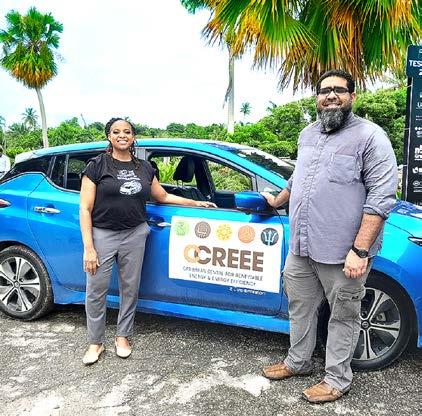
the regional body has been incredibly supportive of the project.
Dr. Henry noted that the launch of the bioCNG vehicle would not have been possible without The CCREEE, which offered the use of its electric car for the test drive. It is now the flagship vehicle bearing the slogan ‘Runs on Sargassum’.
Building on this success, Dr. Henry also outlined the next phase of the project, which involves establishing a biogas station. She said they currently have a small station at the Guinea Estate on four acres of agricultural land and described it as a perfect example of the circular nature of this process. She explained that “the digestate feeds the land, but the gas fuels cars,” creating a sustainable
solution that benefits both agriculture and transportation.
In his remarks, Professor Clive Landis, Principal and Pro-Vice Chancellor of The UWI Cave Hill, praised Dr. Henry for embodying Cave Hill’s mission to “create value from ideas.” His comments came as he suggested that Dr. Henry’s work represents the next phase of The UWI’s strategy to evolve into an entrepreneurial university capable of leveraging research excellence to benefit society.
“Dr Henry is, firstly, leveraging her research on how to convert sargassum into biofuel to create value in society by tackling this pernicious environmental scourge,” Professor Landis stated, adding, “secondly, she is creating value for the uni-
a significant milestone in Barbados’ renewable energy journey. She underscored the fact that Barbados has 150,000 fossil fuel vehicles, and this innovation is important in the transportation sector as Barbados strives to meet its net-zero carbon emissions goals. “Electrification and the use of renewables in transportation are critical for our energy transition,” Minister Cummins noted, adding that the project has the potential to “change the hearts and minds” of the Barbadian public regarding transitioning to renewable energy.
versity itself because the Cave Hill Campus is an equity partner in the venture. Taking an idea through the so-called tech transfer funnel, all the way from the point of conception to the successful pilot stage that we have witnessed today, the point at which it is ready for scale-up and investment, takes persistence and determination.”
Professor Landis hinted that the sargassumpowered vehicle is just the beginning. He said The UWI plans to introduce other sargassum-based innovations soon, including products for pest control and diabetes treatment.
Meanwhile, in her address, Senator Lisa Cummins, Minister of Energy and Business, lauded the project as
Minister Cummins also highlighted the broader potential of sargassum beyond Barbados, urging the region to embrace the opportunity. “This is a regional and a global first-mover opportunity. Barbados has pioneered a technology that can change the way the entire Caribbean treats to transportation, and I want us to not take that for granted,” she said, expressing confidence that Barbados will continue to lead in renewable energy.
The launch event was hosted by Rum and Sargassum Inc. and Supernova Lab of Future Barbados. Sponsors included The CCREEE, The UWI, NGC Green Company Limited, the National Petroleum Corporation, the Inter-American Development Bank, the Caribbean Climate-Smart Accelerator, TOSL Engineering Limited, and RL Mark & Company. For more information, contact Dr. Pamala Proverbs 1-246-230-5979
VIEW, PHILIPSBURG — On Friday September 20, 2024, Her Excellency Acting Governor Emiko Bird-Lake, in accordance with article 56 of the Sint Maarten constitution, administered the oath to the Members of Parliament at the Governor’s Cabinet. The new Members of Parliament were elected in the August 19, 2024 Snap elections. In a public meeting of Parliament on September 16, the MP’s credentials were examined by the parliamentary committee on the credentials in accordance with article 54 of the Sint Maarten constitution. The official swearing in of the members of parliament is the last formal step that is taken to allow the elected members of parliament to officially fulfill their duties and enact their powers under the constitution. In principle, the new parliament of Sint Maarten will be in function until September 20, 2028.
Vice-chairlady of the Council of Advice; Chairman of the Audit Chamber; Ombudsman; Chairman of the social economic council; Griffier of Parliament; Acting Chairlady of the Central Voting Bureau; Acting chairlady of the Electoral Council; Commander of the Marines detachment on Sint Maarten; Vice president of the joint court; Distinguished guests, ladies, and gentlemen; A pleasant Good morning On August 19th, of this year, 61% of the eligible voters of Sint Maarten, came out for this snap election and used their democratic right and
voted each one of you into this legislative body of government known as the parliament. Congratulations parliament elect on this new opportunity!!
This body is made up of 15 elected members from seven political parties.
A diverse group of people, with different political backgrounds, personalities, life experiences, beliefs, morals, unique perspectives, and ways of thinking.
Both professionally and academically, research has shown that diversity brings an increase in innovation, creativity, motivation, problem-solving and ultimately promotes team unity.
“Real diversity and inclusion doesn’t mean that we will always agree. It means that even when we disagree, we can still respect each other. We can vehemently disagree with someone’s ideology while passionately pursuing their humanity.”
“ — Justin Jones-Fosu.
All members of parliament have equal rights, privileges, and obligations. The majority has the right to decide. The minority has rights which must be protected.
As you embark upon your new responsibilities, I want to highlight your three main tasks as elected parliamentarians:
• To represent the interests and concerns of the people of Sint Maarten.
• To act as co-legislator /a law maker.
• To examine and be prepared to challenge the work of the government; scrutinize the expenditures, administration and policies.
Over the past years, we have endured environmental, social and economic challenges.
We have been focusing mostly on building back a more resilient Sint Maarten which includes
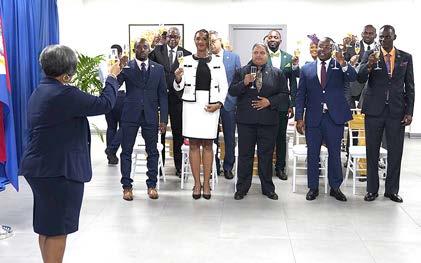
the well-being of our society, but in reality it is evident that it remains a struggle for many of us to thrive.
The main strategic goal should be to ensure that Sint Maarten can become self-sustainable in every aspect.
To ensure that our future generations can survive and thrive on this our “sweet Sint Maarten land”. Decisions made must foster sustainability.
Sustainable development is development that meets the needs of the present without compromising the ability of future generations to meet their own needs. Through sound planning and good preparation you can effectively and efficiently accomplish your goals. As the saying goes “when you fail to plan, you plan to fail”. As a parliamentarian a broad spectrum of knowledge, understanding and wisdom is needed . Wisdom usually does not fall into your lap. That is because wisdom is not just a mentality—it is a physical reality with practical applications. I encourage you members of parliament to lead and make decisions in an ethical and transparent manner. Set aside personal agendas
and use your position in Parliament to ensure good governance. Maintain a united front as it remains a collective responsibility.
You are democratically elected representatives of the people of Sint Maarten, and you must justify your decisions to the people of Sint Maarten. As parliamentarians you are also human beings that can be flawed. Therefore, it is important to remember to manage expectations and to try as best as possible to keep your moral compass pointing in the right direction. Follow your rules of order, be thorough in complying with members’ interests and ensure that you are transparent and maintain a high degree of integrity.
Your success is directly related to your integrity, resilience, diligence, perseverance and discipline. You have four fundamental guidelines to assist you and keep you focused during your term in parliament: 1. Integrity; 2. Allegiance; 3. The Rule of Law; and 4. The general interest of the people of St. Maarten. I swear (declare) that I have not given or prom-
ised anything to anyone whosoever, directly or indirectly, under any name or pretext whatsoever, in connection with me being elected as a Member of Parliament, nor shall I do so.
I swear (promise), that I shall not accept any pledge or gift of any description from any person whatsoever, directly or indirectly, in order to take or refrain from any action of any description in this position. Integrity. I swear (promise) my loyalty to the King and the Charter for the Kingdom; Allegiance. that I shall always help to uphold the Constitution of Sint Maarten The Rule of Law. and shall promote the well-being of Sint Maarten to the best of my ability.
The general interest of the people of Sint Maarten.
With honor I now proceed to invite you forward to take the oath, the final step required in order for you to be able to carry out your function as members of Parliament. Let us begin.
Congratulations Members of parliament, Congratulations family members and friends, Congratulations to the people of Sint Maarten, God bless Sint Maarten.
PHILIPSBURG – In a dramatic turn of events, Lisa Alexander, a local politician, business owner, and legal advisor, was arrested at her Dawn Beach residence on the morning of September 16, 2024, as part of an ongoing fraud investigation. Alexander, 52, who recently ran for public office on the Oualichi Movement for Change (OMC) party in the August 2024 snap elections, was taken into custody during a raid conducted by the St. Maarten Police Force (KPSM) in collaboration with the Prosecutor’s Office and other law enforcement agencies.
According to a press release from the Public Prosecutor’s Office, Alexander’s arrest was part of a broader investigation into allegations of fraud. She remains a suspect in the case, even though
the court ordered her conditional release on September 20, 2024. Under the terms of her release, Alexander is required to regularly report to the probation service and must remain reachable and available to police and justice authorities throughout the ongoing investigation. While the specifics of the fraud case have yet to be officially confirmed, unverified reports suggest that Alexander, a legal advisor with considerable influence in the community, had been soliciting money from individuals seeking assistance with immigration paperwork. Several sources allege that despite collecting payments, Alexander failed to deliver on her promises, leaving many in precarious legal positions.
Reports have surfaced of at least two cases of embezzlement, including one incident where Alexander allegedly collected $70,000 for





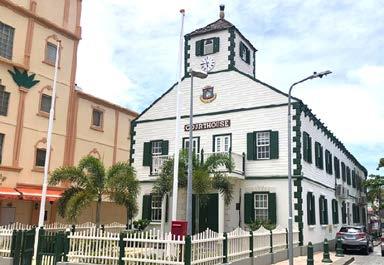
the sale of a company for an immigrant but failed to finalize the transaction through a notary. The investigation is ongoing, and law enforcement has urged anyone with relevant information or complaints to come forward and assist in the case.
A Politician’s Fall from Grace Alexander’s arrest is particularly notable due to her high-profile status in St. Maarten’s political and business circles. Known for her legal and constitutional expertise, Alexander has served as a business consultant and legal advisor to many local businesses. Her political journey has seen her contest elections under various banners, including the Democratic Party (DP) earlier this year in January, the People’s Progressive Alliance (PPA) in 2020, and the United St. Maarten Party (USP) under the
leadership of Frans Richardson in previous elections. Her recent run with OMC in the August 2024 elections, just a month before her arrest, was viewed as another attempt to secure political office and champion reform. However, her defeat in that election and the subsequent legal challenges have overshadowed her campaign and raised serious questions about her professional conduct. Alexander’s arrest has sent shockwaves through St. Maarten’s political and business communities. Her reputation as a trusted advisor, legal expert, and political figure has come under intense scrutiny, with many questioning the extent of her alleged criminal activities.
Law enforcement officials conducted searches at both her home and her administrative office in Philipsburg, confiscating

several items deemed critical to the investigation. These developments suggest that the authorities are deeply committed to ensuring that justice is served in this high-profile case.
As Alexander remains a suspect in this ongoing investigation, the island waits to see how this case unfolds. Should the allegations prove true, it could mark the downfall of another well-known figure in St. Maarten’s political landscape.
The public is urged to report any information related to the fraud case to the Detective Department in Philipsburg to aid in the investigation. With St. Maarten’s small, closely-knit community, the outcome of this investigation could have far-reaching implications for both the legal and political sectors. For more updates on this developing story, stay tuned to StMaartenNews.com.

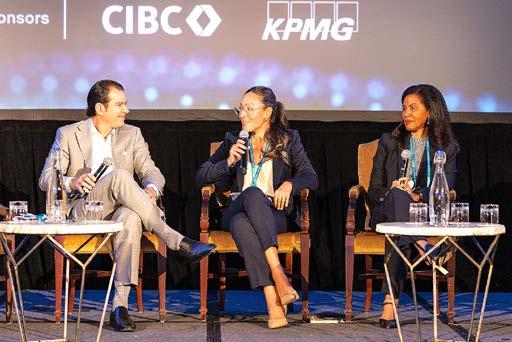
Miami, Florida, September 26, 2024 –CIBC Caribbean’s lead in sustainable finance has been highlighted through its words and in its actions at this year’s Caribbean Investment Forum (CARIF). During the twoday event in Miami, Florida, representatives of the bank steered impactful conversations on various topics as well as revealed its US$500 million achievement in sustainable finance activities.
CIBC Caribbean’s Director of Investment Banking, Isabel de Caires, revealed that in 2023 alone, CIBC Caribbean has arranged more than US$1 billion in transactions, and to date, has arranged more than US$500 million in sustainable finance with commitments in excess of US$300 million.
She said, “As a proud sponsor of CARIF and
as a Caribbean bank, CIBC Caribbean is committed to the sustainable development and economic growth of our region.”
During CARIF 2024, Isabel de Caires spearheaded a session on revitalizing tourism through sustainable infrastructure. The discussion focused on the use of local resources such as geothermal facilities and reverse osmosis systems, resilient development practices to withstand natural disasters, and the need for innovative financial instruments to support growth. The necessity of resiliency in tourism projects, especially considering natural disasters, was underscored along with the need for sophisticated financial instruments to support sustainable development in the region. The importance of private sector collaboration rather than government reliance was a key theme which stressed the need for clear governmental policies and frame-
works that support private investment. CIBC Caribbean’s Director of Corporate Banking for the British Virgin Islands and Cayman Islands, Gemel Sobers, conducted an insightful interview with the Cayman Islands’ Chief Officer of Ministry of Planning, Agriculture, Housing, and Infrastructure, Eric Bush. The dialogue covered strategic national development planning and initiatives focused on transportation, housing, food security, and climate resiliency in the Cayman Islands. Ranging from approaches to road design and construction to public housing and food security, Bush outlined efforts towards, and opportunities related to, Cayman development.
A more intimate morning session titled Regional Energy Connection: Political Commitment, Technical Support, Financing, and The Infrastructure Need was co-hosted by CIBC Caribbean’s Executive Director of Cor-
CIBC Caribbean’s Director of Investment Banking, Isabel de Caires (Center), spearheaded a session on revitalizing tourism through sustainable infrastructure with IDB Invest Head of Tourism, Rogerio Basso (L) and Caribbean Hotel and Tourism Association President, Nicola Madden-Greig (R). CIBC Caribbean
porate Banking and Sustainable Finance, Corporate and Investment Banking, Gillian Charles-Gollop, and the Caribbean Development Bank’s Acting Division Chief, William Ashby. It addressed the challenges and opportunities in developing renewable energy interconnections across the Caribbean.
Charles-Gollop later moderated a panel discussion on sustainability development in the Caribbean. The session highlighted the economic benefits of sustainable investments. The panel comprised of Giuseppe Mancinelli (United Nations Office for Project Services), Kristin McCarthy (Sandals Resort International), Dr. Damie Sinanan (Caribbean Export Development Agency), and Jeremy Superfine (Orchid Development). Each panelist emphasized the importance of sustainable practices to mitigate climate risks, diversify economies, and reduce reliance on fos-
sil fuels, among other factors. During CARIF 2024, speakers from CIBC Caribbean highlighted the bank’s commitment to mobilizing resources and expertise to bolster development projects that not only promise high economic returns but also prioritize environmental sustainability and community resilience. Isabel de Caires added that, “This conference represents a unique opportunity to exchange ideas, to show and share best practices, and develop actionable plans to support critical and sustainable infrastructure development.”
CIBC Caribbean’s leadership at CARIF 2024 underscores its pivotal role in shaping a sustainable development agenda that not only promotes economic growth but also addresses the pressing need for communityfocused and environmentally sustainable initiatives across the Caribbean.
By Tadzio Bervoets
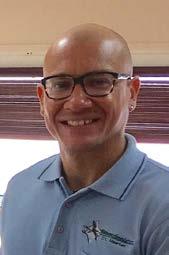

Dear Editor,
In light of the renewed emphasis on reigniting agriculture on the island, it is important to also realize that without conservation measures to protect our natural resources this ambition may be but a pipe dream if we continue along our current path. As a Small Island Developing State, St. Maarten’s efforts toward self-sufficiency and food security through agricultural development are vital, especially given our island’s vulnerability to external shocks driven by climate change.
However, while these developments are promising, it is essential to recognize that any agricultural revival will remain unsustainable unless it is firmly grounded in the protection and restoration of our terrestrial ecosystems and that now is the time to take a leadership role in championing conservation practices, as this would lay the foundation for sustainable agriculture and food security for our country.
Many successful examples from other island states show us that agriculture and environmental conservation must go hand in hand should there be any real progress. Take the case of Cuba, where, following the collapse of trade in the early 1990s, the island adopted agroecological farming practices that integrated biodiversity conservation into its agricultural systems. By protecting natural ecosystems and using organic farming methods, Cuba not only stabilized its food production but also became a global leader in sustainable agriculture. Similarly, Fiji has implemented community-based forest conservation programs that not only preserve biodiversity but enhances the soil and water quality essential for agricultural productivity. These examples offer valuable lessons for St. Maarten: when we protect our natural resources, agriculture flourishes in a way that benefits both the environment and enhances food security. Terrestrial conservation is not merely an environmental issue—it is the backbone of any agricultural ambition. Healthy ecosystems provide the critical services that agriculture depends on; soil fertility, water management, and natural pest control. Forests and native vegetation contribute to soil health by preventing erosion, enhancing water retention, and facilitating nutrient cycling. If our forests continue to be degraded, St. Maarten will face severe challenges in maintaining the soil fertility necessary for productive farming. Additionally, terrestrial ecosystems play an integral role in regulating water systems. Forests and healthy landscapes ensure that rainfall is absorbed and released slowly, reducing the risk of both drought and flooding. Agriculture cannot thrive without a reliable and consistent water supply and we have not been doing the most stellar of jobs in ensuring that our fresh water supply- and yes we do have a fresh water supply, just look at our wells- are sufficiently managed and conserved.
Biodiversity, including native birds, insects, and other wildlife, also supports agriculture by promoting pollination and natural pest control. By damaging these ecosystems through deforestation or urban expansion, we not only reduce agricultural productivity but make it more costly and chemically dependent. Moreover, the rising threat of invasive species is a pressing issue on St. Maarten. Invasive plants and animals, often introduced through human activity, displace native species and disrupt ecosystems critical for agricultural success. If invasive species continue to spread unchecked, they will further degrade the natural landscape and threaten both biodiversity and agriculture. Investment in terrestrial conservation, including invasive species management, is a necessary defense for ensuring agricultural resilience. We can already see the impact the invasive mon -
key and iguana populations have had on our budding agricultural initiatives.
If the current environmental degradation continues, any talk of reigniting agriculture on St. Maarten will be unrealistic. We cannot afford to overlook the fact that agriculture and conservation are inextricably linked. Consider the case of Haiti, where extensive deforestation over the years has led to soil erosion, loss of biodiversity, and a severe decline in agricultural productivity. On the flip side, the Dominican Republic, which shares the same island of Hispaniola, has invested in reforestation and conservation initiatives, allowing it to maintain more robust agricultural productivity. The contrasting outcomes of these two countries highlight how critical environmental protection is for sustainable agriculture.
The current vision of reigniting agriculture on St. Maarten is commendable and necessary, but it must be rooted in a broader framework of environmental sustainability. Any agricultural policy that does not prioritize the health of our natural ecosystems is bound to fail in the long term.
Protecting and restoring terrestrial habitats is not only a way to enhance agriculture but also a means to ensure food security, reduce vulnerability to climate change, and to promote a healthier and more resilient island.
Our leaders have a critical role to play in supporting these efforts through championing conservation practices by establishing the first protected nature park on land. This would safeguard biodiversity, promote ecosystem restoration, and provide a foundation for sustainable agriculture to thrive. Additionally, parliament should act by turning the existing hillside policy into formal conservation legislation to protect St. Maarten’s remaining forested areas. Hillside conservation is crucial for maintaining the natural water cycle, preventing erosion, and preserving the habitats that local wildlife and agricultural systems depend on.
Another key action for both government and parliament would be to finally approve the zoning plans and ensure that all new development projects undergo rigorous environmental and social impact assessments. These assessments are vital for identifying the potential negative impacts of land use changes and for developing strategies to mitigate those impacts. Approving and enforcing zoning regulations, especially those designed to protect natural areas, will create a more balanced approach to development that respects the island’s environmental limitations while encouraging responsible agricultural growth.
The news of advancing agriculture is important for St. Maarten, but we must ensure that it is built on the solid foundation of terrestrial conservation. Without safeguarding the environment, agricultural initiatives will be unsustainable, leaving our island even more vulnerable to environmental and economic pressures. True progress requires a balance between agriculture and nature—only then can St. Maarten grow and prosper in harmony with its environment. It is time for both the government and parliament to take the lead in making environmental sustainability a core part of our island's agricultural future.
Sincerely,
Tadzio Bervoets
Caribbean Conservation Professional
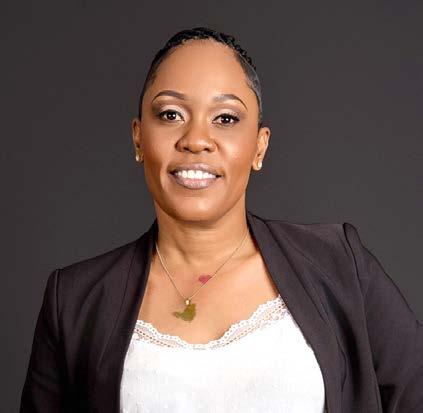
GREAT BAY — The persistent power outages plaguing St. Maarten have become a national crisis, severely impacting small hoteliers and their guests. The St. Maarten Small Properties Association (SMSPA), led by President Ms. Paulina Nzinga Lake, has voiced its concerns, applauding Honorable MP Ludmila de Weever for bringing this critical issue to the floor of Parliament.
Small hoteliers, the backbone of St. Maarten’s hospitality industry, are grappling with the harsh realities of inconsistent power supply. These outages not only disrupt essential services like air conditioning, internet, lights, telephone, and security systems but
also significantly tarnish the overall guest experience. “The small hotel experience should be a comforting escape, but constant disruptions create uncertainty for our guests. The ambiance, comfort, and safety are compromised, leading visitors to reconsider their choice of accommodation,” said Ms. Lake.

The economic implications of these power outages are profound. Small hotels face mounting operational costs as they rely on backup generators to provide temporary relief. However, the soaring utility bills add further strain on already limited resources, pushing these establishments to the brink of financial distress. “Our hotels are our backbone, and without reliable power, we face the crippling challenge of not only losing income but also damaging our SMSPA members’ reputation,” Ms. Lake emphasized. The ripple effects of this crisis extend beyond the hospitality sector. Tourists deterred by fears of power interruptions may choose destinations with more reliable infrastruc-
tures, leaving small hotels struggling to attract visitors and maintain their core services. This decline in tourism can have a devastating impact on the local economy, which heavily relies on the hospitality sector.
Ms. Lake calls for immediate action from policymakers and the utility provider to address the national power supply crisis. “We urge stakeholders to prioritize solutions that will enhance the stability of our power grid, ensuring that small hoteliers and businesses can thrive and continue to provide exceptional experiences for visitors,” she stated.
As the situation evolves, the Small Properties Association (SMSPA) remains committed to supporting its members, guests, and stakeholders while actively seeking innovative ways to maintain service excellence. The association’s dedication to advocacy and finding sustainable solutions underscores the urgent need for a reliable power supply to safeguard the future of St. Maarten’s hospitality industry.
For more insights and updates on this developing story, visit https://news.sx/business/hidden-costs-recurrent-power-outages-for-small-hoteliers.

~ MP Ludmila De Weever’s Candid Speech on Party Leadership and Policy Recommendations ~
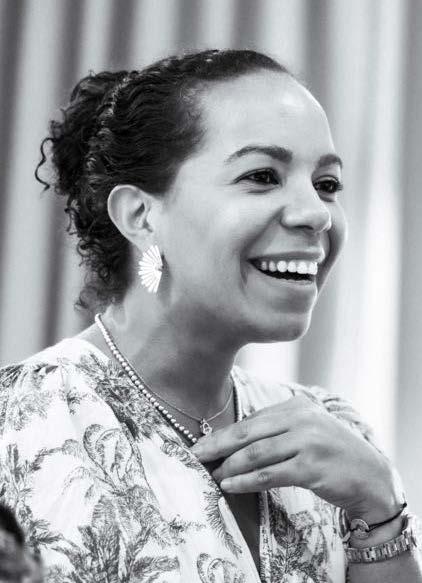
her preferred role in the government, focusing on where she believed her strengths could be better applied. However, the party’s leadership decided otherwise, leaving her feeling unsupported. She revealed that despite this disappointment, she continued to push forward in a mature and transparent manner, even addressing these issues directly with the party leader.
“I felt like the party was holding me back,” De Weever shared, further elaborating that she had been excluded from key candidate meetings, which had a significant impact on her ability to contribute meaningfully to the party’s direction. Recommendations to the Incoming Ministers

PHILIPSBURG – In a bold and revealing address, Member of Parliament (MP) Ludmila De Weever expressed her frustrations with Party for Progress (PFP) leadership while offering crucial insights and recommendations for the incoming ministers in the Council of Ministers.
On the day of the closing of the parliamentary year, De Weever not only addressed personal political struggles but emphasized the necessity for political leaders to prioritize the struggles
of the people over power dynamics within their ranks.
Highlighting her disappointment with the internal dynamics of the PFP, De Weever candidly spoke about her disillusionment with the party’s leadership and decision-making processes. She reflected on the lack of support she received from her party leader, Melissa Gumbs, and the exclusion she faced from key meetings, signaling deeper internal fractures within the PFP.
In a striking remark
that encapsulated her frustration with the state of leadership in St. Maarten, De Weever stated: “Leaders get caught up in power struggles instead of actually getting caught up in the peoples’ struggles.”
This powerful statement resonated as she reminded her colleagues that their primary role is to serve the people of St. Maarten, not to engage in political infighting. Disappointment with PFP Leadership
De Weever shared that she had been clear about
thus expanding the revenue base.
- Public Infrastructure: Improve road markings and resolve the issue of sewage running on roads, particularly in tourism-heavy areas.
- Education: Ensure that children with special needs, especially those on the autism spectrum, receive proper educational support and resources.
- Affordable Housing for Essential Workers: Work with the private sector to offer tax relief and incentivize property owners to provide affordable housing for essential workers, such as nurses, police officers, and teachers.
Despite the political tension, MP De Weever remained focused on the bigger picture, providing a series of policy recommendations aimed at improving governance and addressing the struggles of the people. These recommendations were directed toward the incoming ministers, urging them to act on pressing issues. The following are key areas De Weever highlighted:
- Justice System Workers: Address the discrepancy in benefits between full-time justice system workers and their counterparts. De Weever advocated for equal benefits for all workers within this critical sector.
- SZV Policyholders: Expand the policyholder base to include sole proprietors such as taxi and bus drivers, reducing the burden of private insurance costs.
- Tax Reform: Decrease property taxes to 15% and consider reforms that allow sole proprietorships to be held by naturalized citizens,
De Weever’s recommendations underscored her commitment to creating tangible changes that address the everyday struggles of the people, moving away from the political power plays that often dominate parliamentary discourse. A Call for Maturity in Leadership
In her closing remarks, De Weever emphasized the need for political maturity, urging all members of parliament to embrace compromise for the greater good of the country. “What our country deserves right now is maturity, and the hardest thing of leadership is compromise,” she stated, calling on her colleagues to rise above personal ambitions and focus on the collective well-being of St. Maarten.
As the second-highest vote-getter in the recent elections, De Weever assured her 689 supporters that she remains dedicated to fulfilling her role in Parliament and will continue to hold the government accountable while working to improve the lives of the people.
“Governor
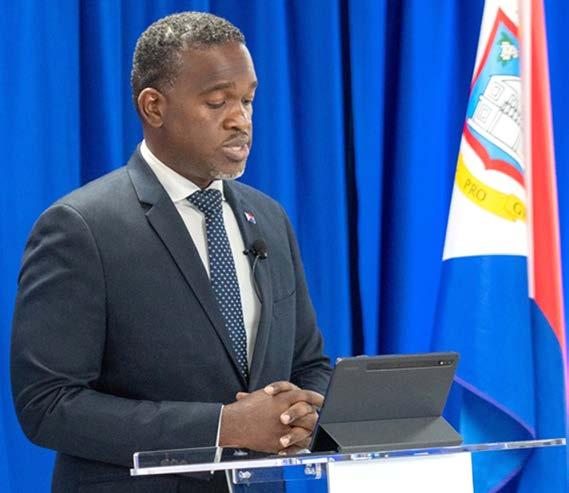
HARBOUR VIEW, PHILIPSBURG —
Considering the results of the August 19, 2024, elections, consultations held with the political leaders of all seven political parties that have succeeded in gaining at least one seat, and in taking due account of the four parties that signed the declaration of intent to form a coalition on Thursday August 22, 2024, namely the SAM, the PFP, the DP and the URSM, His Excellency Governor Ajamu G. Baly, LL.M. has requested the leader of the URSM, Mr. Luc Mercelina, to take into consideration an assignment as Formateur.
In that capacity, the Governor has requested Mr. Mercelina to form a new government that can count on the long-term support of the four political groups that have committed themselves to supporting a government and to formulate a governing-program that is based on the political manifestos of the parties involved and the following substantive points that have been put forward in the aforementioned consultations:
• The circumstances surrounding N.V. GEBE and in particular the realization of a reliable supply of electricity and water and, by extension, the generation of sustainable electricity in Sint Maarten;
• The improvement of
Sint Maarten’s financial management and the timely realization of the country’s annual budget, as well as a revision of the tax structure;
• Improving the quality of education;
• Combating poverty and the improvement of the purchasing power of the population;
• Improving the state of the environment in Sint Maarten and taking the necessary steps for climate adaptation;
with the Netherlands;
• Enacting legislation concerning the screening of (candidate) ministers, in accordance with the recent advice issued by the Council of Advice
and the Integrity Chamber; and
• The implementation agenda of the Country Packages, as well as the relationship with the World Bank and the NRPB.
The Governor further emphasized the importance of the strict observance of the regulatory requirements, including the screening criteria applicable to the appointment for candidate-ministers.
The Formateur took the commission into consideration and will keep the Governor informed on a weekly basis during the formation process. The Governor requested Mr. Mercelina to present him the final report of the formation process by November 15, 2024.

• A reform of the electoral system with the purpose of strengthening the stability of the political process;
• The introduction of a general health insurance;
• Investments in the economy, infrastructure and in the relationship




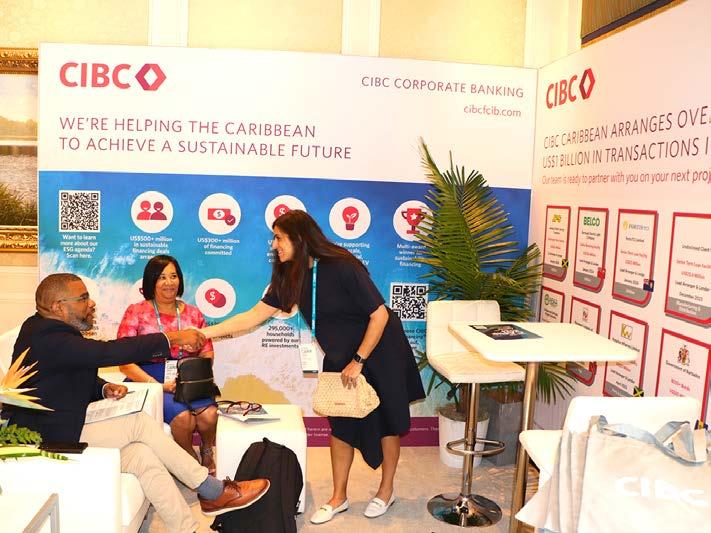
Miami, Florida, September 26, 2024 –Hundreds of policy makers, investors, financiers, and project developers from across the Caribbean and the wider globe have gathered at the Ritz Carlton Coconut Grove in Miami, Florida to collaborate and converse on the future of infrastructure investment.
Hosted by New Energy Events with co-title sponsors CIBC and KPMG, the highly anticipated Caribbean Infrastructure Forum (CARIF) 2024 will feature comprehensive
updates and opportunities related to power, transportation, telecommunications, tourism, water, and other essential sectors.
CIBC Caribbean’s Executive Director of Corporate Banking and Sustainable Finance, Corporate and Investment Banking, Gillian CharlesGollop, emphasized that, “The Caribbean Infrastructure Forum is a critical gathering for dialogue and action in our region. CIBC is committed to fostering partnerships that drive sustainable investment and innovative infrastructure solutions.”
Over two days, participants will engage in keynote presentations, interactive panel discussions, and targeted workshops that will explore topics such as sustainable development, financing mechanisms, and regional connectivity.
The event kicked off with exciting panels including one titled Ramping Up Financing for Caribbean Infrastructure. The discussion featured CIBC Caribbean’s Managing Director and Head of Investment Banking, Forex and Derivative Sales, Adam Carter. He was joined by Ramon
Candia, Adam Greenfader, Victoria Miles, Brian Whitesides, and Dustin Delany, representatives from CIFI, AG&T, Impacta Global, U.S. International Development Finance Corporation, and Dentons Delany, respectively.
CIBC Caribbean’s Enterprise Security and Fraud Management representative, Derick Burton, presented on Cybersecurity for Critical National Infrastructure. He underscored cyber risk as an increasing concern for Caribbean governments, businesses, and infrastructure.
Critcal conversations like these will continue with other experts including CIBC Caribbean’s Isabel de Caires, Gemel Sobers, and Gillian Charles-Gollop.
CIBC has been a major CARIF sponsor since the event’s inception in 2016. Over the past 8 years, regional and global leaders have convened to engage in the planning, financing, and construction of infrastructure and capital projects across the Caribbean. The bank remains committed to fostering partnerships that drive sustainable investment and innovative infrastructure solutions.
Dear Editor,
Please allow me the opportunity to express my concerns regarding the unfortunate incidents that occurred on August 22, 2024, involving the St. Kitts & Nevis registered motor vessels ‘Blue Wave’ and ‘Paradise Sun,’ during our planned travel, scheduled for 9:00 AM, from St. Eustatius (Statia) to St. Kitts. Eighteen (18) passengers, including young children, were keenly anticipating the celebrations surrounding a family wedding set to take place in St. Kitts on August 24. Despite our careful planning and compliance with all necessary arrangements, our experience was marred by an unexpected and unnecessary delay caused by the Dutch Caribbean Coast Guard and Statia’s Maritime department inspection protocols.
The Coast Guard’s decision to conduct inspections on the ‘Blue Wave’ only after boarding had begun – despite observing the loading of luggage – not only caused undue distress but also exposed us to harsh weather conditions for an extended period. The lack of communication and apparent disregard for the passengers’ well-being raises serious questions about the procedures followed by the Coast Guard.
After the Coast Guard identified alleged discrepancies, the maritime inspector (Mr. van Rink) decided to get involved, which delayed the inspection process even longer. The Coast Guard officer was then questioned why the vessel was not inspected earlier. Why wait after the luggage was loaded and the boarding of passengers had commenced? After some discussion he apologized for the manner in which the situation was handled. Another officer also approached the group to apologize and further explain what had transpired. He proceeded to give the absurd excuse that the reason why the vessel was not inspected earlier was that the captain was not present. So, the crew could not be questioned about the captain’s whereabouts and instructed not to proceed with the loading of baggage and the boarding of passengers until the captains arrival? Extremely dubious, but we digress. We were subsequently informed that maritime inspector failed the ‘Blue Wave’ and we were not allowed to travel.
Alternative arrangements were promptly made. Our disappointment deepened when the other vessel, ‘Paradise Sun,’ was also denied clearance, by the maritime inspector, due to alleged missing paperwork, despite being a reputable vessel with a recognized local agent. In fact, this vessel has a contract with the Golden Rock Dive & Nature Resort and transported passengers to Statia - literally - just a few days earlier. It also recently conducted charters to the Nevis Mango Festival in July 2024. This second failure of inspection felt disproportionate, arbitrary and, coupled with the undue stress caused by the first inspection, left us stranded and without options for travel. The local government officials were ineffectual. The ‘Paradise Sun’ returned to St. Kitts only to be informed just hours later that clearance was now granted. This adds to the confusion and prompts concerns about the consistency and validity of these safety assessments. Considering the late time (8:00 PM) we decided to no longer make use of its services.
The cancellation of our planned pre-wedding event on St. Kitts that evening further diminished the experience for fam-

ily and friends, who had gathered for this joyous occasion. Alternative travel with the regular scheduled Makana Ferry service was arranged on the following day, August 23, for the majority of the passengers.
It is important to acknowledge the role of the Coast Guard in maintaining safety at sea, and while we respect the need for thorough inspections, the manner in which these procedures were enacted during our travels appeared unprofessional and inefficient. The situation was exacerbated by what felt like an abuse of power and lack of understanding by the maritime inspector, leading to severe inconveniences for all affected passengers.
It is our hope that the Coast Guard and Maritime Inspection department can address these serious concerns to ensure that similar incidents do not occur in the future. Improving communication and inspection protocols, as well as taking (local) propriety standards into consideration, may help mitigate situations that impede travel and cause distress to passengers, particularly when young children are involved.
Duggins Family St. Eustatius


World’s largest dementia study reveals that globally:
• 8 out of 10 persons (80% of the general public) think that dementia is a normal part of ageing and do not consider it a medical condition (66% in 2019).
• 2 out of 3 health and care professionals (65%) incorrectly believe dementia is a normal part of ageing (62% in 2019).
• 9 out of 10 people living with dementia (88%) indicate experiencing discrimination (83% in 2019).
• 3 out of 10 of people living with dementia (31%) avoid social situations due to concerns regarding the reactions of others
• 5 of 10 caregivers (47%) stopped accepting invitations to visit family and friends.
• Among the general public, most respondents feel more confident to challenge dementia stigma and discrimination than they did in 2019, especially in highincome countries (64%).
Philipsburg, FRIDAY 20 SEPTEMBER – Results from the world’s largest global survey on attitudes to dementia reveal that stigma around this health condition is still very much present among the general public and even healthcare professionals. The World Alzheimer Report 2024 published by Alzheimer’s Disease International (ADI), was underpinned by a survey which was analysed by London School of Economics and Political Science (LSE).
8 out of 10 persons (80% of the general public) think that dementia is a normal part of ageing
They found a shocking 80% of the public still incorrectly believe dementia is a normal part of ageing rather than a medical condition. This percentage is 14% higher than in 2019 when the survey was last conducted.
CEO of Alzheimer’s Disease
International Paola Barbarino says: “This inaccurate view of dementia is a major concern, particularly from healthcare professionals, as it can delay diagnosis and access to the right treatment, care, and support,” no, adding that this comes at a time when new treatments are being approved around the world, alongside breakthroughs in diagnostics.”
“We need our healthcare professionals to more readily understand that dementia is a medical condition caused by a set of diseases, Alzheimer’s being the most prevalent, so that a correct diagnosis can be given, opening the door for a combination of treatments, care, and support that can enable people to live well for longer, to remain at work, at home, and in the community.”
Approximately 9 of 10 persons living with dementia (88%) have experienced stigma
ADI says ongoing misconceptions about dementia are perpetuating stigma for people who have the condition.
Elco Rosario, well known citizen of St Maarten, lives with dementia which was diagnosed last year as dementia caused by Alzheimer’s Disease. “I started to forget things. They said I was repeating things over and over again. People were
seeing me walking and were talking about me with others, and were avoiding me. I thought that forgetting things is something normal when you get older. Why people started to avoid me? I am still the same Elco Rosario. I did not know that these were signs of a developing dementia condition. My family reached out to the St Maarten Alzheimer’s Foundation and I got to know much more about what was happening in my brain. I was happy when I could go to radio interviews and information evenings about Alzheimer’s to tell others about what I experience. With acceptance and help from my good friend Minlow and his wife from Merengue Bar, from mister Jessurun of the Alzheimer’s foundation and neurologist Dr Marquez from SMMC, I can live much better now. I am going to live now with my family in Curacao after having been in St Maarten for more than 40 years.”
The World Alzheimer’s Report 2024 contains 24 essays from experts around the world about overarching issues related to attitudes regarding dementia, as well as case studies of stigma and initiatives to address it. Here a few statements of contributors in the report: For Brother John-Richard Pagan, one of the contributors to the report, his biggest challenge was getting people to believe him when he said there was a problem. “Ageism is rampant... People assume that if you are under the age of 65, there is no way that you can be having issues with cognitive impairment. They just don’t take
you seriously.” Natalie Ive, who also wrote an essay in the World Alzheimer Report 2024, was told she “didn’t look like she had dementia” because she was diagnosed with younger-onset at the age of 47. Emily Ong, a person living with dementia, says that many healthcare practitioners she has encountered through her advocacy work have disclosed they had received very limited medical training on dementia, which may have contributed to their perception that dementia is a normal part of the ageing process. “The most concerning part of this is how it could lead to delayed, wrong, or missed diagnosis,” she says.
There is also good news. Drs Raymond Jessurun secretary of the St Maarten Alzheimer’s Foundation after reading the report acknowledges that now more persons interviewed felt more confident to tackle stigma than in 2019. We all can make a change through supporting World Alzheimer’s Month. He applauded the Ministry of Public Health Social Development and Labor for have taken the initiative to raise awareness about dementia in collaboration with the Collective Preventive Services, the Alzheimer’s Foundation, the White & Yellow Cross Foundation and the Henry Ostiana Foundation. More persons interviewed are aware of the effects of their lifestyle on the risk of developing a dementia condition: over 58% of the general public is agreeing now that dementia is caused by an unhealthy lifestyle and
45% of persons living with dementia reported to have been impacted by 14 modifiable risk factors. Even though this is important progress, we still have a long way to go to get everyone in our Caribbean region to agree with this and to act upon this.
The consequences of stigma: Isolation a prominent issue for people living with dementia
The report also concluded that due to increasing stigma, people living with dementia are isolating themselves: 31% of people living with the condition avoided social situations and 36% stopped applying for work, through fear of being stigmatised. What is also worrisome is that 47% of family caregivers stopped accepting invitations to visit friends and family and 43% stopped inviting people over.
“We know that social isolation is a risk factor for developing dementia and can worsen symptoms or mental health, this is therefore incredibly concerning.”
The CEO of Alzheimer’s Disease International Paola Barbarino believes that we can change this sitigma surrounding dementia: “Encouragingly, in a year when over 2 billion people around the world are eligible to vote in elections, our survey found that more than 80% of the general public believe that they can change the support provided to people with dementia through their vote. We need to galvanise people and create a movement, to advocate to political leaders that the time to act on dementia is now.”

— The United Workers Party (UWP) has announced its intention to take legal action against the Government of Dominica concerning the Citizenship By Investment (CBI) Program. The announcement was made during a press conference held by the UWP, where it was revealed that Senior Counsel and Former Attorney General of Trinidad and Tobago, Anand Ramlogan, and his team, will be leading the case.
Ramlogan, who addressed the press conference, emphasized the significance of the case not only for Dominica but for the entire region. “We have been asked to assist with this groundbreaking, historic, and landmark case in the public interest,” he stated. “The Citizenship By Invest-
ment Program has generated significant monies that are meant to be spent for the benefit of the public in Dominica.”
He continued, “We see the case as one that is important for the region because it will establish some significant constitutional boundaries as it relates to the government’s duties to the people through the parliament.”
Ramlogan also mentioned the intention to request the government to disclose a copy of the agreement for the program, “and between the government and its agents we intend to ask to see the terms and conditions of that contract, because there have been public admissions and statements of fraudulent practices within that program.”
The case is constructed
based on the Dominican constitution, specifically on the principle that all monies and revenues earned by the government are meant to be paid into the consolidated fund, which is subject to parliamentary scrutiny and approval for any form of expenditure. “Significant funds are not reaching the consolidated fund but are being spent,” Ramlogan remarked. “We intend to challenge the whole agency relationship as it relates to certain agents. We intend to interrogate that relationship to the fullest to examine what are the terms and conditions to see whether there is any form of favoritism, whether or not there is any form of corruption or mismanagement.”
UWP President Lennox Linton acknowledged that the decision to take the government to court was not
made lightly. “This has been quite a journey for us for the past five years, having taken the decision that we would go to court with this,” he stated. “We have received opinions and second opinions. We have spoken to a number of lawyers. We have, in the course of time, asked ourselves whether we should go forward with this.”
Linton continued, “After all, no institution wants to sue their government. But we came to the point where, since the government refused to do anything and since the situation involving all the billions of dollars being unaccounted for through the scheme just kept going from bad to worse, we decided that we had to move forward with this.”
Furthermore, Linton said this is an important day for the party as the matter goes through the legal system.
Meanwhile, Deputy Leader of the UWP, Attorney Ronald Charles, clarified that the case is not intended to end the CBI Program. “Let us not mislead the Dominican people,” he urged. “Let us focus on justice, integrity, and what the constitution says to abide by rules and regulations.”
Charles continued, “Therefore, accountability is important to us, especially as it relates to the CBI Program.” He stated that he and his associates will assist Senior Counsel and his team.
Source: Dominica News Online
He added, “We were pleased to be able to have the services of Senior Counsel Anand Ramlogan and his team from Trinidad.”
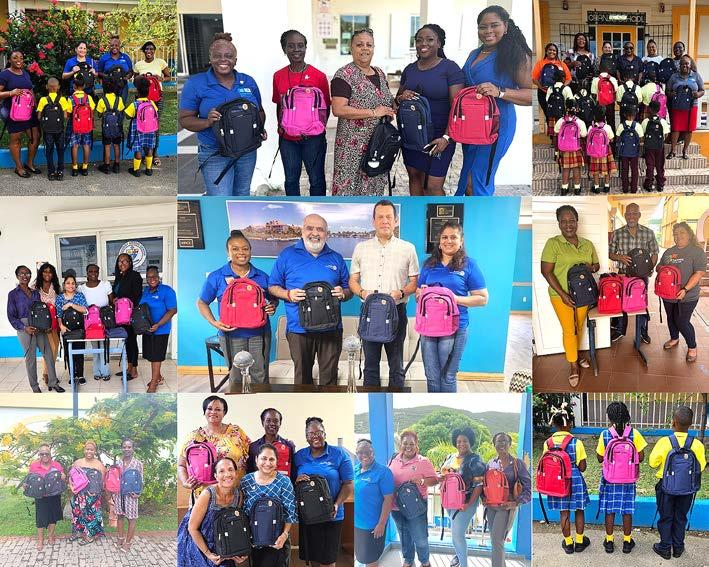
PHILIPSBURG – The Rotary Club of St. Martin Sunrise continues its annual “Back to School Program,” a long-standing initiative designed to equip students with the essential tools for academic success. This program led by Rotarian Marcellia Henry, Club Leadership Chair and Facilitator, was a resounding success.
Several members of the club joined the distribution at different schools, making the event a collaborative and im-
pactful experience for all involved.
This year’s project, in collaboration with Princess International Group of Companies Sint Maarten and Qredits, has made a significant impact by distributing school bags and supplies to local schools and foster homes.
The project is part of the Club’s commitment to community empowerment through education. By providing students with these critical resources, the initiative helps to remove educa-
tional barriers and ensures that young learners across the island can begin the new school year prepared, confident, and motivated to succeed. “These school bags are more than just supplies— they represent the club’s dedication to fostering a positive learning environment and building confidence in the community’s youth“. said the Rotary Club of St. Martin Sunrise President Jharna Dialani.
As the Rotary Club of St. Martin Sunrise continues to
expand its educational initiatives; it remains committed to empowering students and strengthening the community’s future leaders. The club is eager to build on the success of this year’s School Bag Project and looks forward to future partnerships that will further enhance the educational journeys of local youth. For more information about the Rotary Club of St. Martin Sunrise or to learn how you can support the club’s community projects, please visit our Facebook Page or contact any of our members.